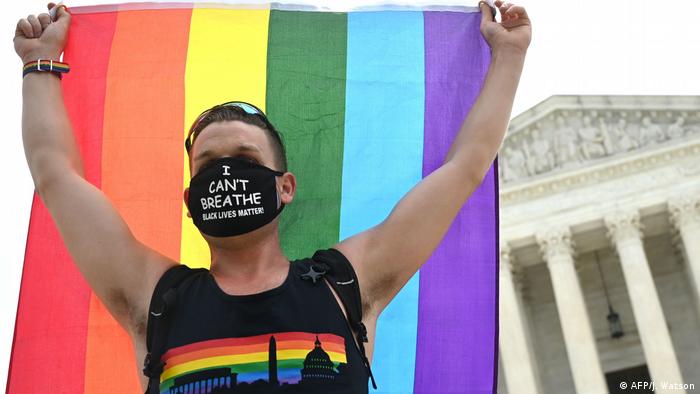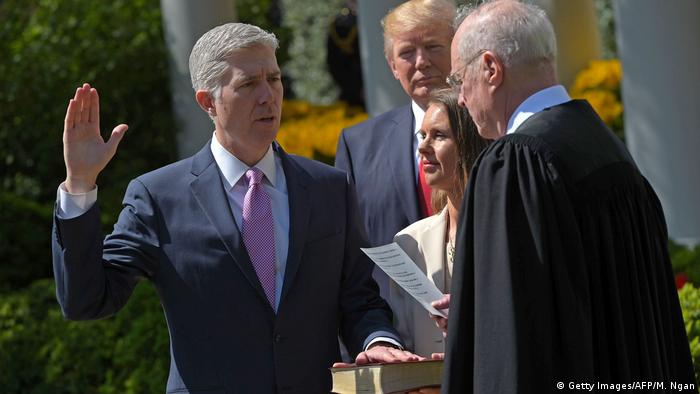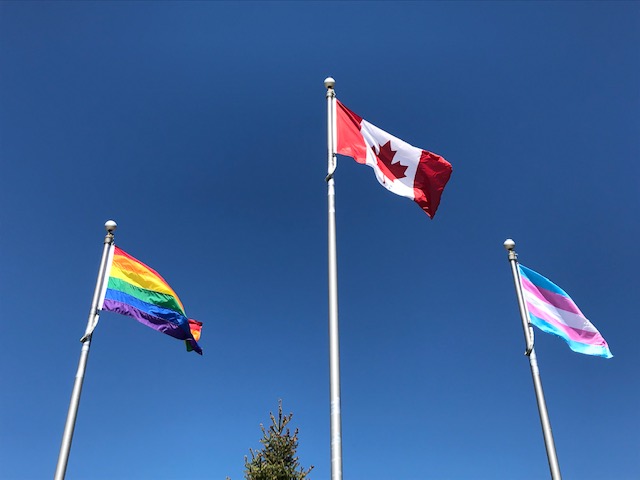PRIDE MONTH VICTORY
SCOTUS Justices rule LGBTQ2 people protected from job discrimination
UNDER TITLE VII CIVIL RIGHTS ACT 1964
THE ONE THE REPUBLICANS OPPOSED UNDER
GOLDWATER AND STILL OPPOSE
Full Coverage: U.S. Supreme Court
“The Court tries to convince readers that it is merely enforcing the terms of the statute, but that is preposterous. Even as understood today, the concept of discrimination because of ‘sex’ is different from discrimination because of ‘sexual orientation’ or ‘gender identity,’” Alito wrote in a dissent that was joined by Thomas.
The outcome is expected to have a big impact for the estimated 8.1 million LGBT workers across the country because most states don’t protect them from workplace discrimination. An estimated 11.3 million LGBT people live in the U.S., according to the Williams Institute at the UCLA law school.
The cases were the court’s first on LGBT rights since Justice Anthony Kennedy’s retirement and replacement by Kavanaugh. Kennedy was a voice for gay rights and the author of the landmark ruling in 2015 that made same-sex marriage legal throughout the United States. Kavanaugh generally is regarded as more conservative.
The Trump administration had changed course from the Obama administration, which supported LGBT workers in their discrimination claims under Title VII.
During the Obama years, the federal Equal Employment Opportunity Commission had changed its longstanding interpretation of civil rights law to include discrimination against LGBT people. The law prohibits discrimination because of sex, but has no specific protection for sexual orientation or gender identity.

In recent years, some lower courts have held that discrimination against LGBT people is a subset of sex discrimination, and thus prohibited by the federal law.
Efforts by Congress to change the law have so far failed.
That ruling was a victory for the relatives of Donald Zarda, who was fired in 2010 from a skydiving job in Central Islip, New York, that required him to strap himself tightly to clients so they could jump in tandem from an airplane. He tried to put a woman with whom he was jumping at ease by explaining that he was gay. The school fired Zarda after the woman’s boyfriend called to complain.
Zarda died in a wingsuit accident in Switzerland in 2014.
In a case from Georgia, the federal appeals court in Atlanta ruled against Gerald Bostock, a gay employee of Clayton County, in the Atlanta suburbs. Bostock claimed he was fired in 2013 because he is gay. The county argues that Bostock was let go because of the results of an audit of funds he managed.
The 11th U.S. Circuit Court of Appeals dismissed Bostock’s claim in a three-page opinion that noted the court was bound by a 1979 decision that held “discharge for homosexuality is not prohibited by Title VII.”]
Aimee Stephens lost her job as a funeral director in the Detroit area after she revealed to her boss that she had struggled with gender most of her life and had, at long last, “decided to become the person that my mind already is.” Stephens told funeral home owner Thomas Rost that following a vacation, she would report to work wearing a conservative skirt suit or dress that Rost required for women who worked at his three funeral homes. Rost fired Stephens.
The 6th U.S. Circuit Court of Appeals in Cincinnati, Ohio, ruled that the firing constituted sex discrimination under federal law.
Stephens died last month.
LGBT workers protected under civil rights law, rules US top court
LGBT workers are protected against discrimination at work, the US Supreme Court has ruled. Two conservative judges, including Trump appointee Justice Neil Gorsuch, sided with the four liberal justices for a 6-3 verdict.

The US Supreme Court decided in a historic decision on Monday that a key provision of the 1964 Civil Rights Act protects workers who are lesbian, gay, bisexual or transgender (LGBT) against job discrimination.
The court ruled in a 6-3 vote that federal protections against workplace discrimination against employees because of a person's sex, also covers sexual orientation and transgender status.
The ruling was authored by conservative Justice Neil Gorsuch, who was appointed by President Donald Trump in 2017.
Chief Justice John Roberts, another conservative, along with the court's four liberal justices, joined Gorsuch's opinion.

US Supreme Court justice Neil Gorsuch (52) became the youngest Supreme Court appointee since Clarence Thomas in 1991, who is still on the bench
"An employer who fires an individual for being homosexual or transgender fires that person for traits or actions it would not have questioned in members of a different sex," Justice Neil Gorsuch wrote for the court.
"Sex plays a necessary and undisguisable role in the decision, exactly what Title VII forbids."
Conservative Justices Samuel Alito, Clarence Thomas and Brett Kavanaugh dissented from the ruling.
The cases were the court's first on LGBT rights since Justice Anthony Kennedy's retirement and replacement by Justice Brett Kavanaugh.
Kennedy was a voice for gay rights and the author of the landmark ruling in 2015 that made same-sex marriage legal throughout the United States.
kw/msh (AFP, AP, Reuters)
Date 15.06.2020
Related Subjects Discrimination, LGBT+ rights, LGBT+
Keywords LGBT, LGBT rights, discrimination, sexual discrimination, Brett Kavanaugh, Supreme Court
Permalink https://p.dw.com/p/3do9k

Bill C-16: Canada’s New Federal Human Rights Legislation
Published on 2017 · 07 · 11 by Julian
By MARK SHERMAN

The Supreme Court is seen in Washington, early Monday, June 15, 2020. (AP Photo/J. Scott Applewhite)
WASHINGTON (AP) — The Supreme Court ruled Monday that a landmark civil rights law protects LGBT people from discrimination in employment, a resounding victory for LGBT rights from a conservative court.
“An employer who fires an individual for being homosexual or transgender fires that person for traits or actions it would not have questioned in members of a different sex. Sex plays a necessary and undisguisable role in the decision, exactly what Title VII forbids,” Justice Neil Gorsuch wrote for the court.
Justices Samuel Alito, Brett Kavanaugh and Clarence Thomas dissented.
JUSTICES ROBERTS AND GORSUCH JOINED THE CLASSICAL LIBERALS

The Supreme Court is seen in Washington, early Monday, June 15, 2020. (AP Photo/J. Scott Applewhite)
WASHINGTON (AP) — The Supreme Court ruled Monday that a landmark civil rights law protects LGBT people from discrimination in employment, a resounding victory for LGBT rights from a conservative court.
The court decided by a 6-3 vote that a key provision of the Civil Rights Act of 1964 known as Title VII that bars job discrimination because of sex, among other reasons, encompasses bias against LGBT workers.
“An employer who fires an individual for being homosexual or transgender fires that person for traits or actions it would not have questioned in members of a different sex. Sex plays a necessary and undisguisable role in the decision, exactly what Title VII forbids,” Justice Neil Gorsuch wrote for the court.
Justices Samuel Alito, Brett Kavanaugh and Clarence Thomas dissented.
JUSTICES ROBERTS AND GORSUCH JOINED THE CLASSICAL LIBERALS
Full Coverage: U.S. Supreme Court
“The Court tries to convince readers that it is merely enforcing the terms of the statute, but that is preposterous. Even as understood today, the concept of discrimination because of ‘sex’ is different from discrimination because of ‘sexual orientation’ or ‘gender identity,’” Alito wrote in a dissent that was joined by Thomas.
The outcome is expected to have a big impact for the estimated 8.1 million LGBT workers across the country because most states don’t protect them from workplace discrimination. An estimated 11.3 million LGBT people live in the U.S., according to the Williams Institute at the UCLA law school.
The cases were the court’s first on LGBT rights since Justice Anthony Kennedy’s retirement and replacement by Kavanaugh. Kennedy was a voice for gay rights and the author of the landmark ruling in 2015 that made same-sex marriage legal throughout the United States. Kavanaugh generally is regarded as more conservative.
The Trump administration had changed course from the Obama administration, which supported LGBT workers in their discrimination claims under Title VII.
During the Obama years, the federal Equal Employment Opportunity Commission had changed its longstanding interpretation of civil rights law to include discrimination against LGBT people. The law prohibits discrimination because of sex, but has no specific protection for sexual orientation or gender identity.

In recent years, some lower courts have held that discrimination against LGBT people is a subset of sex discrimination, and thus prohibited by the federal law.
Efforts by Congress to change the law have so far failed.
The federal appeals court in New York ruled in favor of a gay skydiving instructor who claimed he was fired because of his sexual orientation. The full 2nd U.S. Circuit Court of Appeals ruled 10-3 that it was abandoning its earlier holding that Title VII didn’t cover sexual orientation because “legal doctrine evolves.” The court held that “sexual orientation discrimination is motivated, at least in part, by sex and is thus a subset of sex discrimination.”
The Supreme Court cases involved two gay men and a transgender woman who sued for employment discrimination after they lost their jobs.
That ruling was a victory for the relatives of Donald Zarda, who was fired in 2010 from a skydiving job in Central Islip, New York, that required him to strap himself tightly to clients so they could jump in tandem from an airplane. He tried to put a woman with whom he was jumping at ease by explaining that he was gay. The school fired Zarda after the woman’s boyfriend called to complain.
Zarda died in a wingsuit accident in Switzerland in 2014.
In a case from Georgia, the federal appeals court in Atlanta ruled against Gerald Bostock, a gay employee of Clayton County, in the Atlanta suburbs. Bostock claimed he was fired in 2013 because he is gay. The county argues that Bostock was let go because of the results of an audit of funds he managed.
The 11th U.S. Circuit Court of Appeals dismissed Bostock’s claim in a three-page opinion that noted the court was bound by a 1979 decision that held “discharge for homosexuality is not prohibited by Title VII.”]
Aimee Stephens lost her job as a funeral director in the Detroit area after she revealed to her boss that she had struggled with gender most of her life and had, at long last, “decided to become the person that my mind already is.” Stephens told funeral home owner Thomas Rost that following a vacation, she would report to work wearing a conservative skirt suit or dress that Rost required for women who worked at his three funeral homes. Rost fired Stephens.
The 6th U.S. Circuit Court of Appeals in Cincinnati, Ohio, ruled that the firing constituted sex discrimination under federal law.
Stephens died last month.
LGBT workers protected under civil rights law, rules US top court
LGBT workers are protected against discrimination at work, the US Supreme Court has ruled. Two conservative judges, including Trump appointee Justice Neil Gorsuch, sided with the four liberal justices for a 6-3 verdict.

The US Supreme Court decided in a historic decision on Monday that a key provision of the 1964 Civil Rights Act protects workers who are lesbian, gay, bisexual or transgender (LGBT) against job discrimination.
The court ruled in a 6-3 vote that federal protections against workplace discrimination against employees because of a person's sex, also covers sexual orientation and transgender status.
The ruling was authored by conservative Justice Neil Gorsuch, who was appointed by President Donald Trump in 2017.
Chief Justice John Roberts, another conservative, along with the court's four liberal justices, joined Gorsuch's opinion.

US Supreme Court justice Neil Gorsuch (52) became the youngest Supreme Court appointee since Clarence Thomas in 1991, who is still on the bench
"An employer who fires an individual for being homosexual or transgender fires that person for traits or actions it would not have questioned in members of a different sex," Justice Neil Gorsuch wrote for the court.
"Sex plays a necessary and undisguisable role in the decision, exactly what Title VII forbids."
Conservative Justices Samuel Alito, Clarence Thomas and Brett Kavanaugh dissented from the ruling.
The cases were the court's first on LGBT rights since Justice Anthony Kennedy's retirement and replacement by Justice Brett Kavanaugh.
Kennedy was a voice for gay rights and the author of the landmark ruling in 2015 that made same-sex marriage legal throughout the United States.
kw/msh (AFP, AP, Reuters)
Date 15.06.2020
Related Subjects Discrimination, LGBT+ rights, LGBT+
Keywords LGBT, LGBT rights, discrimination, sexual discrimination, Brett Kavanaugh, Supreme Court
Permalink https://p.dw.com/p/3do9k

Bill C-16: Canada’s New Federal Human Rights Legislation
Published on 2017 · 07 · 11 by Julian
On Thursday, June 15th, 2017, after over a year, Bill C-16 passed its final reading. This legislation – sponsored by Liberal Party MP Jody Wilson-Raybould who currently serves was Canada’s Minister of Justice – is now in effect. It added gender identity and gender expression to the list of prohibited grounds of discrimination in the Canadian Human Rights Act along with related protections in the Criminal Code of Canada. Put simply, it is now illegal in areas of federal jurisdiction to discriminate against someone because of their gender identity or expression.


Not only has legislation protecting gender identity and gender expression now passed at the federal level, most provinces and territories in Canada now also include protections in their own human rights legislation. The Northwest Territories’ government was the first in the Canada to include gender identity protections in its Human Rights Code though gender expression still remains unprotected there. British Columbia’s Human Rights Code was amended in July 2016 to include gender identity or expression as protected grounds.

No comments:
Post a Comment